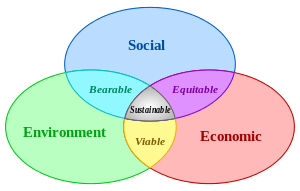Environmental studies
 |
| Environment |
|---|
|
|
|
Environmental studies is a multidisciplinary academic field which systematically studies human interaction with the environment in the interests of solving complex problems. Environmental studies brings together the principles of sciences, commerce/ economics and social sciences so as to solve contemporary environmental problems. It is a broad field of study that includes the natural environment, built environment, and the sets of relationships between them. The field encompasses study in basic principles of ecology and environmental science, as well as associated subjects such as ethics, geography, policy, politics, law, economics, philosophy, environmental sociology and environmental justice, planning, pollution control and natural resource management.[1]
History
The New York State College of Forestry at Syracuse University established a BS in environmental studies degree in the 1950s, awarding its first degree in 1956.[2] Middlebury College established the major there in 1965.[3]
The Environmental Studies Association of Canada (ESAC) was established in 1993 "to further research and teaching activities in areas related to environmental studies in Canada".[4] ESAC's magazine, A\J: Alternatives Journal was first published by Robert A. Paehlke on 4 July 1971.[5][6]
The Association for Environmental Studies and Sciences (AESS) was founded in 2008 as the first professional association in the interdisciplinary field of environmental studies in the United States. The Association's scholarly journal, the Journal of Environmental Studies and Sciences (JESS), commenced publication in March 2011.[7]
See also
- Bachelor of Environmental Studies
- Conservation Commons
- Environmental ethics
- Environmental communication
- Environmental education
- Environmental social science
- Environmental sociology
- Environmental geography
- List of environmental degree-granting institutions
- List of environmental degrees
- List of environmental journals
- List of environmental studies topics
- Sustainable development
References
- ↑ National Center for Education Statistics. Classification of Instructional Programs (CIP 2000)- (03) NATURAL RESOURCES AND CONSERVATION. Institute of Education Sciences, United States Department of Education. [Accessed 29 January 2010]
- ↑ http://www.esf.edu/es/history.htm
- ↑ http://www.middlebury.edu/academics/es
- ↑ http://www.esac.ca/about/a-brief-history-of-esac/ "A Brief History of ESAC". Accessed 12 March 2012.
- ↑ Alternatives
- ↑ "The Alternatives Story"
- ↑ Association for Environmental Studies and Sciences
External links
- Association for Environmental Studies and Sciences
- Environmental Studies Association of Canada
- Journal of Environmental Studies and Sciences
